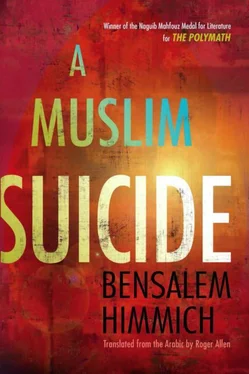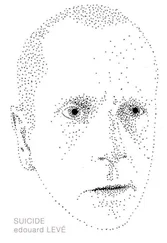My interlocutor remained silent for a while, then fixed me with an affectionate and sympathetic stare.
"Holy man of God," he said, "may I be made your ransom! By God, I have watched as the Angel of Death has snatched away souls in whole clusters. He has looked straight at me. `Your turn soon!' he's threatened. At the Battle of Damietta I was hoping for martyrdom with every thrust I made, but my prayers were not answered. It was as though Izrail, the Angel of Death, was not interested in me and kept pushing me aside for some other time. So here I sit before you, still alive, albeit with a body that is sick and decrepit. I have no idea how I'm going to die, but what I do know for sure is God's own words: `God will not grant any soul a delay when its time has come."'
I made clear that I agreed with him, regretting all the while that I had even raised the subject. As we concluded our conversation, it was obvious that we were in agreement.
"Let's go and prepare ourselves for prayer."
We headed for the ancient house of Abraham, did our ablutions once again, and prayed some extra prayers along with the assembly of Muslim believers. We then sat down in an alcove and whispered some other parts of the Qur'an and litanies. Once we had finished, each of us returned serenely to his normal level of consciousness. I surmised that my companion was doing as I was, namely engaging in sacred and lofty thoughts about the passion of Abraham, the faithful companion and pioneer monotheist, and the tears of Hagar, mother of Ismail and our female ancestor. Maybe, like me, he was also considering the way that change and the passage of time had affected his life. At any rate, the two of us stayed there till dawn, at which point we performed the prayers.
When the pilgrimage season arrived, I took Abu al-Hasan early to Mina, accompanied by a group of his followers and my servant, Ghaylan. They all took turns in helping my companion perform the familiar rituals, all of which showed convincingly that Abu al-Hasan was really weak and incapacitated (even though he himself put on a brave front in order to convince us all of the opposite, something that only made him even more tired). By the waterspout and at 'Arafa he performed his prayers in a voice so low that no one could either hear or understand them.
When the pilgrimage season was over, I was delighted that the holy man of love and generosity was still alive and breathing. He spent several days resting, all the while receiving my students and his beloved friends. Once his health had recovered somewhat, he convened a chanting and recitation session on my roof. How we all enjoyed his rare and unique gift on these occasions! He used to chant two suras, "The Light" [Nur] and "The Merciful" [Rahman], and other parts of the text in a melodious tone that made our bodies shiver with excitement. Tears regularly flowed from people's eyes and coursed down cheeks and lips. When he chose to sing some of his zajals in praise of the Prophet and other holy narratives-as he had done previously when we had been together in Cairo-everyone began to accompany him (as best they could), either vocally or with gentle clapping or beats on drums and tambourines. Some people were even tempted to stand up and perform the Sufi dance, repeating the phrase "God is aliiiiiiiive.. Both Ghaylan and Yasir danced, and they did it superbly.
In such an august and wonderful atmosphere of devotion, we all relished each and every moment and bathed in its wondrous light till dawn. At that point we all stood up, duly enlightened and excited, and went to perform the prayers in the great mosque.
We also held sessions like this one in the Valley of Solomon's Spring, which was about a day's journey from Mecca itself. Abu al-Hasan had had another hut built there, modeled on the one in Bijaya. The valley was surrounded on all sides by orchards and fields that had been put there by highly experienced Moroccan peasants. For such occasions the peasants prepared a variety of dishes, mostly consisting of vegetables, as a way of honoring their shaykh, Al-Shushtari, and his companions, I being one of the most prominent among the latter group. They also took part in the Sufi rituals, dancing and singing. In the open air amidst plants, torches, and tents, the sessions were even more spectacular for being conducted in a fertile valley, full of wonderful aromas and scents. In such an environment Abu al-Hasan began to recover his health; or perhaps he was managing to supplant the weaknesses of his bodily frame with heavenly light, in that his entire spirit seemed to be aglow with a sublime, holy essence. As each session drew to a close and the group rose at dawn, I watched as he rolled his body in the dust. "One piece of dust hankers for the other, my beloved friend!" he told me. I would simply stay there, watching him with all due affection.
We used to hold our sessions in the Valley of Solomon's Spring or the Meknesi residence once or twice a month. Between such occasions days and seasons passed by with their usual daily concerns and religious rituals. Once Abu Numa had discovered that I had no desire to attend his parties and ceremonies, he requested that I meet him in private. He asked me about Abu al-Hasan. I gave him a short summary of his life and made it clear that he really needed time on his own to recover his health. Abu Numa asked for my views on matters relating to people in Mecca, the Prophet's family, and ways of improving the pilgrimage season. My responses reflected whatever my mind told me was best. When it came to discussing the best posture toward Sultan Baybars, I gave terse answers or asked for time to think about it. When I was alone with Abu al-Hasan, I asked him what he thought about the Sultan Baybars question. His reply was to the effect that I should be very economical in my contacts with the sharif of Mecca and the Shiite people in the city. Furthermore, if Baybars were to come to the city in order to check on things, I should hide somewhere safe.
One morning when the weather was moderately warm, my companion expressed the desire to visit the Hira' Cave. At noontime he mounted a compliant mule and rode off with me. By nighttime we had reached the Mountain of Light (Al-Nur) region. I hurriedly tied up the mule and gave it some food and drink. I then carried an exhausted Abu al-Hasan up to the cave. Once there I handed him his blanket and lit some candles so we could emulate the practice of the Prophet, lord of the messengers and model for monotheists. We spent most of the night this way, not closing our eyes and only using gestures and glances to discuss the cave and its contents. We went back down to our residence immediately after performing the dawn prayer, our souls deeply moved by the experience and filled with a spirit of joy and sanctity.
I accompanied Al-Shushtari on many other visits both to the cave and to the Valley of Solomon's Spring. In the valley we used to spend the night, either in his hut or in a tent. During the daytime he introduced me to the Maghribi peasants one by one, beginning with their chief, Hamada the Zanati. He made a point of extolling my virtues to the skies, then gave me the benefit of his wide knowledge of the vegetable and fruit species that they were cultivating so expertly-species that were previously unknown in the Arabian Peninsula. All I could do was to congratulate these folk for their skill and ask God's blessings on them. They in turn thanked us profusely and asked my colleague and me to pray for them and their families. We both proceeded to do just that, both together and separately.
When the weather was really hot in Mecca, I used to convene sessions for students and followers in the orchards of the valley, with Abu al-Hasan in attendance. The topics of those lessons would involve questions that they posed to me or that I would direct at them. The majority concerned matters of jurisprudence and Sufism. The sessions used to begin between afternoon and sunset prayer times, and some of them extended into the evening. We would continue them, spending pleasant hours performing litanies, Sufi rituals, and recitations. On one occasion I preferred to dismiss the group so that I could spend some time alone with Abu al-Hasan and ask him about Sultan Baybars. That was because the sultan's shadow had recently started to insert itself into my dreams.
Читать дальше












